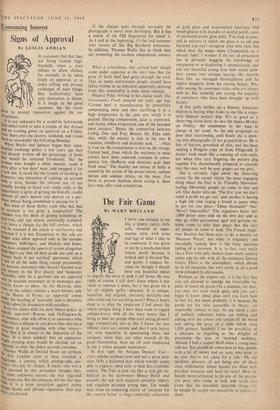The Fair Game
By MARY HOLLAND
HAVE one antique in my life, a pretty, curvy, little sofa, covered in aqua- marine satin, with arms and legs of what I take to be rosewood. It was given to me by a much-cherished friend, partly because it looked odd in his new flat, and partly, I suspect, be- cause he thought I should have one beautiful object to dignify the mass of junk I call home. He was rights of course. I still don't know where it was made or whence it dates, but it has given me a lot of—slightly guilty—pleasure. It is unique, beautiful, old, original, obviously desirable and who could ask for anything more? What it hasn't done is to allay the suspicions 1 feel about the whole antique thing. I have been wont to regard antique-lovers with all the wary worry that I bring to bear on people who start eating plovers' eggs compulsively late in life. I know the rare 'refined tastes are sweeter and that I only betray my own insecurity in questioning them, but antiques, more than any other branch of the good lifemanship, have up till now reinforced in me a sullen peasant resentment.
At first sight the Antique Dealers' Fair— every exhibit authenticated and not a piece later than 1830, a hallowed date which nobody seems able to explain—does little to heal this irrational enmity. The Fair is laid out like a rich gilt ex- hibition at the Grosvenor House Hotel and assaults the eye with exquisite priceless objects and exquisite priceless young men. The stands vary from an endearing clutter of `antiques for the country home' to huge embattled collections of gold plate and monumental furniture. Old wood gleams with decades of dutiful polish, cases of encrusted jewels glow dully. You look at your- self in mirrors in which the glass is so old and battered you can't recognise your own face, but which bear the magic name Chippendale on a discreet label. I wonder if the joy of possession lies in privately hugging the knowledge of uniqueness or in displaying it ostentatiously, and ask one beautiful young man how much snob- bery comes into antique buying. His nostrils flare like an outraged thoroughbred and he replies haughtily from his rearing height, 'Pos- sibly among the nouveaux riches who are always with us. But certainly not among the 'majority of customers who have been brought tip 'with beauty.'
A few stalls farther on a flowery American matron is buying what looks to me like a singu- larly hideous pottery dog. 'It's as good as a three-ring circus here; we saw the Queen Mother on Friday,' she announces to the man in charge of the stand. As the sale progresses so does their relationship, until finally she is show- ing him photographs of her grandchildren. He is tine of feature, porcelain of skin, and has been reading a Penguin copy of Scott Fitzgerald. It doesn't look much like a meeting of twin souls, but when they start fingering the pottery dog together I'm shamefacedly prepared to concede that this may well be sour grapes on my part.
She is certainly right about the three-ring circus. To the casual visitor the most engaging thing about the Fair is its `Friendly Showman' feeling. Obviously people do come to buy and sell. One dealer tells me, `The first year we don't make a profit we get out,' and another is having a high old time urging a friend to guess what he got for one piece---`Three thousand?' No.' `More? Impossible!' The organisers boast that 1,000 pieceS were sold on the first day and as they go other guaranteed aged and genuine ex- hibits come to take their place. But this isn't all; people do come to look. The French maga- zine Realites has been over to do a feattire on 'Museum Pieces,' but what is singularly and mercifully lacking here is the fussy sanctum feeling of a museum. It is, in fact, very much like a Fair with jolly dealers from small country towns side by side with all the miniature Dorian Grays. There is the atmosphere, which should be in all museums, but very rarely iS, of a good show attended by aficionados.
Perhaps, as the experts say, it is the fact that you are allowed to indulge the irresistible im- pulse to touch the goods ('In a museum, my dear, you may not even touch glass, and you can't begin to know about glass until you learn how to feel it'), but more probably it is because the goods are for sale, accessible in theory, yet impossibly remote in fact. At one stand a pair of unlikely suburban ladies are oohing and aahing over the colour and texture of the wood and asking the price of a table which costs 1,050 guineas. Suddenly I see the possibility of a pleasure as beguiling as the delights of possession– the joys of inverted snobbery. Already I feel a suspect thrill when a young man tells me 'Yes, people do come here to buy, people with a lot of money and no taste, who want to be sure they're not taken for a ride.' Oh, the insidious pleasure of not being one of those crass millionaires whose houses are filled with priceless treasures and have no taste! How in- finitely more attractive to be one of the percep- tive poor who come to look and touch i-Al know that the beautiful, desirable things \N ill be bought by people too insensitive to appr,:c..,: them.






























 Previous page
Previous page